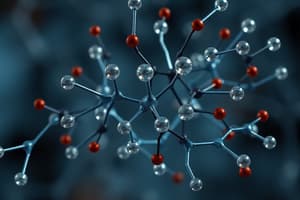Podcast
Questions and Answers
What is a defining characteristic of major depressive disorder?
What is a defining characteristic of major depressive disorder?
- Having feelings of guilt and hopelessness (correct)
- Constant mood uplift in response to something positive
- Experiencing excessive energy levels
- Feeling sad for less than 2 weeks
In major depressive disorder, which symptom is considered a sign of severe depression rather than normal sadness?
In major depressive disorder, which symptom is considered a sign of severe depression rather than normal sadness?
- Poor concentration
- Appetite loss
- Sleep disturbances
- Anhedonia (inability to feel pleasure) (correct)
How long must a sad mood persist to potentially indicate major depressive disorder?
How long must a sad mood persist to potentially indicate major depressive disorder?
- 2 weeks or longer (correct)
- Less than 1 week
- Exactly 2 weeks
- More than 3 weeks
Which symptom of major depressive disorder involves the failure to feel a mood uplift in response to something positive?
Which symptom of major depressive disorder involves the failure to feel a mood uplift in response to something positive?
What could be a serious complication of major depressive disorder?
What could be a serious complication of major depressive disorder?
What factors have been implicated in causing major depression?
What factors have been implicated in causing major depression?
What distinguishes feelings of sadness in major depressive disorder from 'normal' sadness or grief?
What distinguishes feelings of sadness in major depressive disorder from 'normal' sadness or grief?
Which specific symptom of severe depression is rarely present in normal sadness?
Which specific symptom of severe depression is rarely present in normal sadness?
What can be a possible outcome if the person with major depressive disorder sees life as no longer worth living?
What can be a possible outcome if the person with major depressive disorder sees life as no longer worth living?
How do nursing interventions help patients with major depressive disorder?
How do nursing interventions help patients with major depressive disorder?
Flashcards
Mood Disorders
Mood Disorders
Disturbances in mood, behavior, and affect beyond normal fluctuations.
Mood
Mood
A pervading feeling that interferes with social and psychological functioning.
Affect
Affect
Outward expression of emotion attached to ideas.
Blunted affect
Blunted affect
Signup and view all the flashcards
Flat affect
Flat affect
Signup and view all the flashcards
Restricted affect
Restricted affect
Signup and view all the flashcards
Inappropriate affect
Inappropriate affect
Signup and view all the flashcards
Labile affect
Labile affect
Signup and view all the flashcards
Major Depressive Disorder (MDD)
Major Depressive Disorder (MDD)
Signup and view all the flashcards
Biological Factors in Mood Disorders
Biological Factors in Mood Disorders
Signup and view all the flashcards
Study Notes
Mood Disorders
- Mood disorders are disturbances in the regulation of mood, behavior, and affect that go beyond normal fluctuations
- Mood disorders are a leading cause of disability worldwide
Mood and Affect
- Mood refers to a pervading feeling that interferes with social and psychological functioning
- Affect refers to the outward expression of emotion attached to ideas
- Variations in affect include:
- Blunted affect: severe reduction in the intensity of outward emotional expression
- Flat affect: complete or almost complete absence of outward emotional expression
- Restricted affect: reduction in the intensity of outward emotional expression
- Inappropriate affect: affect that doesn't match the situation or content of the verbalized message
- Labile affect: rapid and easily changing affective expression, unrelated to external events or stimuli
Challenges in Caring for Patients with Mood Disorders
- Mood disorders may cause primarily somatic (physical) symptoms, leading to mistaken diagnoses of physical illnesses
- Patients may neglect self-care due to lowered motivation and energy levels
- Mood disorders can alter family and social relationships, leading to frustration, anger, and guilt
- Patients may be at risk of abuse or suicide
Causes of Mood Disorders
- Genetic factors: mood disorders occur more frequently in first-degree relatives than in the general population
- Biological factors: deficiencies or abnormalities in neurotransmitters such as norepinephrine, serotonin, dopamine, and acetylcholine
- Psychological theories:
- Cognitive theory: people with depression process information in a negative way
- Behavioral theory: learned helplessness theory suggests that people may become depressed after a negative event
Nursing Interventions
- Explore ways to help patients cope with frequent mood changes
- Encourage vocational opportunities that allow flexible work hours
- Urge patients with artistic ability to pursue a career in the arts where mood changes may be better tolerated
Major Depressive Disorder
- Also known as unipolar major depression
- Characterized by a persistent sad mood lasting 2 weeks or longer
- Accompanied by feelings of guilt, helplessness, or hopelessness, poor concentration, sleep disturbances, lethargy, appetite loss, anhedonia, and loss of mood reactivity
- Can lead to suicidal thoughts or behaviors if feelings of worthlessness, guilt, and hopelessness become overwhelming
Studying That Suits You
Use AI to generate personalized quizzes and flashcards to suit your learning preferences.



